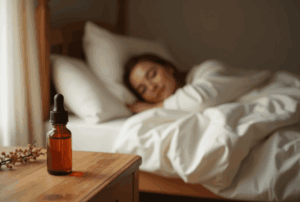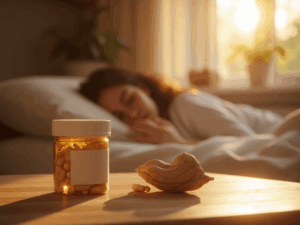If sleep feels harder to come by lately, you’re not the only one. More people are exploring calm sleep aids—natural, low-impact methods designed to ease the mind before bed. These often involve simple, gentle remedies and personal rituals that help your body recognize when it’s time to rest. But with so many approaches out there, how do you know which ones are actually useful? Below, we’ll walk through some of the most effective ways to encourage better nighttime rest—naturally and without harsh side effects.
What Is a Calm Sleep Aid?
A calm sleep aid is any gentle solution that helps your body and mind slow down at night. These might be herbal teas, calming supplements, or even relaxation practices that ease you into a restful state. Unlike prescription medications, these aids don’t knock you out—they work with your body to encourage its natural sleep rhythm. You could try things like deep breathing, reading, or magnesium before bed—whatever helps you detach from the day. The key is that these options help you feel relaxed, not drugged. Over time, a calm sleep aid helps build a more peaceful evening flow, so rest feels easier and more natural.
The Rising Demand for Natural Sleep Remedies
As sleep troubles become more common, interest in natural solutions is growing fast. People are moving away from strong, chemical-based sleep products and looking for sleep aids that align better with the body’s natural rhythms. The best sleep aids natural health seekers turn to are the ones that avoid side effects while still helping the body settle down. Whether it’s a warm cup of tea, a lavender-scented pillow spray, or a quiet pre-bed routine, these tools are showing up in more households. This trend reflects a growing shift toward wellness-based living—where quality sleep is supported, not forced. For many, it’s about long-term health, not just a quick fix.
Herbal Options That Support Calm and Rest
Herbal remedies continue to be a go-to for those looking for a non-invasive way to wind down. Sleep tea for relaxation is especially popular, often made with calming herbs for sleep, like valerian, chamomile, lemon balm, and lavender. These ingredients have long histories in herbal medicine and are known for helping to quiet the mind and settle the body. Some people mix their own blends, while others stick with tried-and-true premade varieties. Drinking warm herbal tea about an hour before bed can work like a cue—it tells your body it’s time to rest. Over time, this kind of routine can make falling asleep feel more natural.
Creating a Personalized Nighttime Routine
A personalized nighttime routine can go a long way in improving how easily and how well you sleep. Start by figuring out what helps you feel calm—whether it’s reading, stretching, or something else that slows your pace. A solid bedtime relaxation routine might include soft lighting, herbal tea, or gentle music. Try a few different combinations until something sticks. What matters most is doing it consistently. Going through the same steps each night tells your body, “We’re done for the day.” And because calm sleep aids are meant to support—not sedate—these habits play a huge role in helping them work. The more your routine reflects your real-life needs, the more powerful it becomes.
How to Choose the Right Calm Sleep Aid for You
Choosing a calm sleep aid starts with knowing your own sleep challenges. Are you having trouble falling asleep, or is your issue staying asleep? Based on that, you can explore gentle sleep remedy options like teas, sleep support drinks, or supplements. Some people prefer drink-based options for their comfort, while others like drops or capsules for convenience. If your stress levels are high, look for ingredients like passionflower, lemon balm, or chamomile. If physical restlessness is the problem, magnesium might help. Whatever you try, give it a little time—natural aids don’t always work instantly, but they tend to build up over a few nights. If nothing helps, it might be worth getting input from a health professional.
Non-Herbal Approaches to Promote Restful Sleep
Not every effective sleep solution comes from a plant. Many people find relief in routines and rituals that don’t involve supplements at all. Activities like reading, journaling, or doing some slow stretches can help release tension. Taking a warm shower or bath is also great for signaling to your nervous system that it’s time to rest. Keep your sleep space cool, dark, and quiet—and try to cut screen time at least 30 minutes before bed. Avoiding blue light lets your melatonin production stay on track. By blending these non-herbal tools with your calm sleep aid, you create an even stronger path to peaceful, uninterrupted sleep.
When to Use a Calm Sleep Aid and When to Skip It
Sleep aids—especially natural ones—work best when used mindfully. If you’ve had a rough day or feel mentally overstimulated, that’s a good time to reach for something soothing. A calm sleep aid can help you settle into the evening without overthinking. That said, these tools aren’t meant for every situation. If you’ve been dealing with sleep problems for weeks—or you suspect something deeper may be going on—it’s smart to speak with a doctor instead of self-treating. Also, try not to rely on them every single night. You want the aid to support your routine, not become the only reason you sleep. Used occasionally and with intention, they’re incredibly effective.
Safety Considerations and Responsible Use
Even though calm sleep aids are natural, they should still be used carefully. Always check labels and start with the lowest recommended amount. If you’re on medication or managing a health condition, talk to a medical provider before adding anything new. Most gentle remedies have minimal side effects, but that doesn’t mean they’re perfect for everyone. Be cautious when combining different products—especially if they contain multiple active herbs. Build your routine slowly, and give your body a chance to respond. Watch how you feel, and if something feels off, it’s okay to stop. Responsible use ensures you get the benefits without putting your health at risk.




